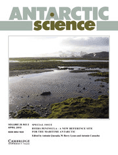
ANTARCTIC SCIENCE
Scope & Guideline
Advancing Understanding of Antarctica's Ecosystems
Introduction
Aims and Scopes
- Ecology and Biodiversity:
Research on the diverse ecosystems in Antarctica, focusing on species interactions, community structure, and the impacts of climate change on biodiversity. - Climate Change and Environmental Monitoring:
Studies assessing the effects of climate change on Antarctic environments, including glacial dynamics, sea ice changes, and long-term ecological monitoring. - Geology and Geochemistry:
Investigations into the geological history and processes in Antarctica, including sediment analysis, stratigraphy, and geochemical assessments of various formations. - Paleoclimatology:
Research exploring past climate conditions through the analysis of geological records, ice cores, and sediment samples to inform current climate models. - Human Impacts and Policy:
Examination of the social, political, and economic dimensions of human activities in Antarctica, including tourism, research policies, and conservation efforts. - Microbial and Extremophile Studies:
Exploration of microbial life and extremophiles in extreme Antarctic environments, contributing to understanding of life in extreme conditions. - Remote Sensing and Spatial Analysis:
Utilization of remote sensing technologies and spatial analysis tools to study Antarctic landscapes, biodiversity, and environmental changes.
Trending and Emerging
- Climate Change Impact Studies:
There is a marked increase in research focused on the impacts of climate change on Antarctic ecosystems, including shifts in species distributions, changes in glacial dynamics, and alterations in marine environments. - Biodiversity and Conservation:
Emerging themes emphasize the importance of biodiversity assessments and conservation strategies, particularly in light of increasing human activities and climate pressures. - Microbial Ecology and Extremophiles:
Research on microbial life and extremophiles has gained traction, reflecting interest in understanding life in extreme conditions and its implications for biotechnological applications. - Interdisciplinary Approaches:
Studies increasingly integrate various scientific disciplines, combining ecological, geological, and social science perspectives to address complex issues in Antarctic research. - Policy and Governance Research:
There is a growing emphasis on the intersection of science and policy, focusing on governance challenges, conservation strategies, and the implications of human activities in Antarctica. - Technological Innovations in Research:
The use of advanced technologies, including remote sensing, unmanned aerial vehicles, and metabarcoding, is on the rise, enhancing data collection and analysis in Antarctic research.
Declining or Waning
- Traditional Glaciology:
Although still relevant, traditional glaciology studies focusing solely on ice core analysis and glacier dynamics have seen a decrease as more interdisciplinary approaches become prevalent. - Historical Exploration Accounts:
Research emphasizing historical accounts of exploration in Antarctica has waned, as contemporary studies focus more on scientific data and environmental changes. - Single-Species Studies:
There is a diminishing focus on studies that examine single species in isolation, as the trend shifts towards understanding ecological interactions and community dynamics. - Static Habitat Studies:
Research that emphasizes static habitat assessments without considering dynamic ecological interactions or climate impacts is becoming less frequent. - Traditional Taxonomy without Molecular Techniques:
The reliance on traditional morphological taxonomy is declining, with a shift towards molecular techniques and genetic studies for species identification.
Similar Journals
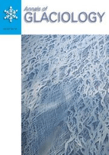
ANNALS OF GLACIOLOGY
Unveiling the Secrets of Our Planet's IceANNALS OF GLACIOLOGY, published by Cambridge University Press, is a premier open-access journal tailored for the field of glaciology and cryospheric sciences. Established in 1980, the journal has become a vital resource for researchers and professionals analyzing the multifaceted interactions between glaciers, ice sheets, and the Earth's climate system. With a commendable Q1 status in Earth-Surface Processes for 2023 and a commitment to open access since 2016, ANNALS OF GLACIOLOGY provides unparalleled visibility and accessibility for cutting-edge research, fostering global dialogue and innovation among scientists. The journal features a broad scope, encompassing both fundamental studies and applied research on glacial characteristics, behavior, and their environmental impacts. Located in Cambridge, England, this journal is particularly essential for those engaged in the ongoing exploration of our planet's cryospheric changes, their implications, and their relevance to climate science.
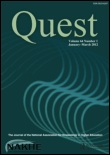
QUEST
Exploring innovative practices in teaching and physical culture.QUEST is a distinguished academic journal published by Routledge Journals, Taylor & Francis Ltd, focusing on the intersection of education and sports science. Established in 1963, this peer-reviewed journal has built a commendable reputation, currently ranking in the Q1 category for Education and Q3 for Sports Science, showcasing its significant contribution to these dynamic fields. With a Scopus ranking of #311 out of 1543 in Social Sciences - Education, QUEST is recognized for its impactful research, embodying a 79th percentile rank that reflects its relevance and quality. The journal seeks to advance the understanding of teaching and learning across various contexts, making it an invaluable resource for researchers, professionals, and students alike, who are engaged in exploring the pedagogical implications of sport and physical culture. Be a part of the ongoing dialogue in education and sports science by accessing the latest in groundbreaking research and innovative practices through QUEST.
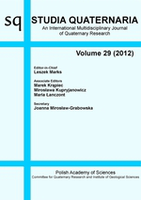
Studia Quaternaria
Uncovering the secrets of geology and Earth-surface interactions.Studia Quaternaria is a leading academic journal published by the Polish Academy of Sciences, Institute of Geological Sciences, specializing in the dynamic fields of Earth-Surface Processes and Geology. With an ISSN of 1641-5558 and an E-ISSN of 2300-0384, this journal has been a prominent platform for scholarly discourse since its inception in 2000. Operating under the open-access model, it aims to disseminate high-quality research that is accessible to a global audience. Studia Quaternaria holds a Q3 ranking in both relevant quartiles as of 2023, indicating its commitment to advancing knowledge in its disciplines despite centering in competitive academic environments. With its publications indexed in Scopus, the journal remains a valuable resource for researchers, professionals, and students looking to stay abreast of innovations and discoveries in Earth-Surface Processes and Geology. Encompassing a broad scope of studies, the journal represents an essential contribution to the geological sciences, fostering a deeper understanding of our planet's changes and processes.
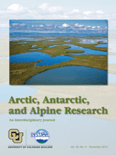
ARCTIC ANTARCTIC AND ALPINE RESEARCH
Connecting Scholars to the Heart of Climate and EcologyARCTIC ANTARCTIC AND ALPINE RESEARCH, published by Taylor & Francis Ltd, is a leading academic journal focused on the comprehensive study of polar and alpine environments, with an emphasis on the ecological, geological, and climatic processes unique to these regions. With an ISSN of 1523-0430 and E-ISSN 1938-4246, this open-access journal has been a vital resource for researchers and practitioners since it embraced open-access publishing in 2018, fostering a wider dissemination of knowledge. Recognized in the 2023 Scopus rankings as a Q2 journal in both Earth-Surface Processes and Ecology, Evolution, Behavior and Systematics, it also attains a Q3 ranking in Global and Planetary Change, highlighting its significant impact and relevance in these fields. The journal covers a span of converged years from 1996, providing a rich archive of research that meets the evolving needs of those engaged in environmental science. By addressing pressing issues such as climate change, biodiversity, and ecosystem dynamics in extreme environments, ARCTIC ANTARCTIC AND ALPINE RESEARCH serves as an indispensable platform for scholarly exchange and collaboration among scientists, policy-makers, and educators committed to advancing our understanding of these critical areas.
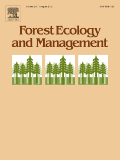
FOREST ECOLOGY AND MANAGEMENT
Elevating Knowledge in Forest EcosystemsFOREST ECOLOGY AND MANAGEMENT is a premier peer-reviewed journal dedicated to the integral study of forest ecosystems and their management, published by Elsevier in the Netherlands. With an impactful presence in the field, this journal boasts a prestigious Q1 ranking in multiple categories, including Forestry, Management, Monitoring, Policy and Law, and Nature and Landscape Conservation as of 2023. It addresses key issues relevant to sustainable forest practices, conservation strategies, and environmental monitoring, making it a vital resource for researchers, practitioners, and policymakers alike. The journal is indexed with an impressive Scopus rank, placing it among the top tier of titles in Agricultural and Biological Sciences and Environmental Science. While it does not offer Open Access options, its rigorous review process and high visibility make it essential for those seeking to stay abreast of the latest findings and trends in forest ecology and management. Published continuously since 1976, FOREST ECOLOGY AND MANAGEMENT aims to foster interdisciplinary collaboration and advance knowledge critical to the stewardship of forest resources in an ever-changing global landscape.
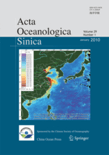
ACTA OCEANOLOGICA SINICA
Diving Deep into Marine and Freshwater StudiesACTA OCEANOLOGICA SINICA, published by SPRINGER, stands as a significant voice in the fields of Aquatic Science and Oceanography, contributing vital research and insights since its inception in 1985. With an ISSN of 0253-505X and an E-ISSN of 1869-1099, this journal maintains a strong international focus, delivering high-quality peer-reviewed articles that address pressing marine and freshwater environmental issues. Although it operates under a subscription model, its Q3 ranking in both Aquatic Science and Oceanography demonstrates its solid standing within Scopus, placing it in the 48th and 44th percentiles respectively. The journal aims to foster knowledge exchange and collaboration among researchers, professionals, and students by providing a platform for innovative studies and comprehensive reviews. With a dedicated editorial board and a commitment to advancing scientific understanding, ACTA OCEANOLOGICA SINICA serves as an essential resource for anyone engaged in the study of oceanographic phenomena and aquatic ecosystems.
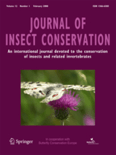
JOURNAL OF INSECT CONSERVATION
Fostering Knowledge for a World Rich in InsectsJOURNAL OF INSECT CONSERVATION, published by SPRINGER in Switzerland, is a leading peer-reviewed journal that focuses on the preservation and study of insect biodiversity and ecology. With an ISSN of 1366-638X and E-ISSN 1572-9753, this journal represents a vital resource for researchers and practitioners in the fields of Animal Science, Ecology, and Insect Science. The journal consistently ranks among the top quartiles, achieving Q1 status in Animal Science and Zoology and Q2 in other pertinent categories in 2023, according to Scopus rankings. This reflects its significant influence in the academic community, with a solid impact factor that highlights its importance in advancing the discourse on insect conservation. Though not an open access journal, it provides critical insights and innovative research findings from 1997 to 2024, making it an essential platform for those involved in the conservation of insect species and their habitats. As a scholarly resource, the JOURNAL OF INSECT CONSERVATION is dedicated to fostering knowledge dissemination and inspiring future research in pressing environmental issues.

Jokull
Connecting Scholars in Earth SciencesJokull is a distinguished journal published by the ICELAND GLACIOLOGICAL SOC, dedicated to advancing knowledge in the field of Earth and Planetary Sciences. Since its inception, Jokull has served as a vital platform for the dissemination of research findings pertaining to glaciology, geomorphology, and related environmental studies, with a rich history spanning from 1980 to 2021. Although the journal's coverage has been discontinued in Scopus, it remains an important resource for academics and practitioners interested in Iceland’s unique geography and climate dynamics. Classified in the Q4 category in the 2023 rankings of Earth and Planetary Sciences, it stands as a testament to the evolving discourse in this vital field of study. Researchers and professionals looking to contribute to or engage with pioneering research are encouraged to explore the insights and findings shared within these pages, even in the absence of open access options. With its headquarters in Reykjavik, Iceland, Jokull continues to facilitate critical discussions and collaborations that shape our understanding of the planet's changing environments.

Earth and Space Science
Championing Open Access for Earth and Space Innovations.Earth and Space Science, published by the American Geophysical Union, is a distinguished open-access journal that has profoundly impacted the realms of earth and planetary sciences as well as environmental science since its inception in 2014. With impressive rankings, including Q1 in both Earth and Planetary Sciences and Environmental Science for 2023, this journal ranks 38th out of 195 in the general Earth and planetary sciences category and 51st out of 219 in environmental science, showcasing its commitment to high-quality research dissemination. The journal serves as a vital platform for researchers, professionals, and students, fostering the exploration of critical topics and advancements within these pivotal fields. With an accessible format, researchers can benefit from the rich content available, furthering their knowledge and ensuring that groundbreaking discoveries reach a broader audience. The journal's ongoing commitment to open access aligns with contemporary trends in scholarly communication, emphasizing inclusion and collaboration in tackling pressing global challenges.

North-Western Journal of Zoology
Exploring the Depths of Zoological ResearchNorth-Western Journal of Zoology is a prominent scholarly publication dedicated to the field of zoology, fostering a vibrant exchange of research findings and insights among scientists, professionals, and students. Published by UNIV ORADEA PUBL HOUSE in Romania, this journal has been a reliable source for advancing knowledge in Animal Science and Zoology since its inception in 2008, with its publications spanning until 2024. With an engaging focus on innovative research and review articles, the journal proudly holds a Q3 quartile ranking in its category for 2023, positioning itself within the competitive landscape of Scopus Ranks. Although currently lacking an open-access model, the journal provides a valuable platform for disseminating critical findings essential to understanding animal biology and ecology. Researchers contributing to this journal benefit from a dedicated readership, furthering the discussion and practical applications of their work in diverse contexts.